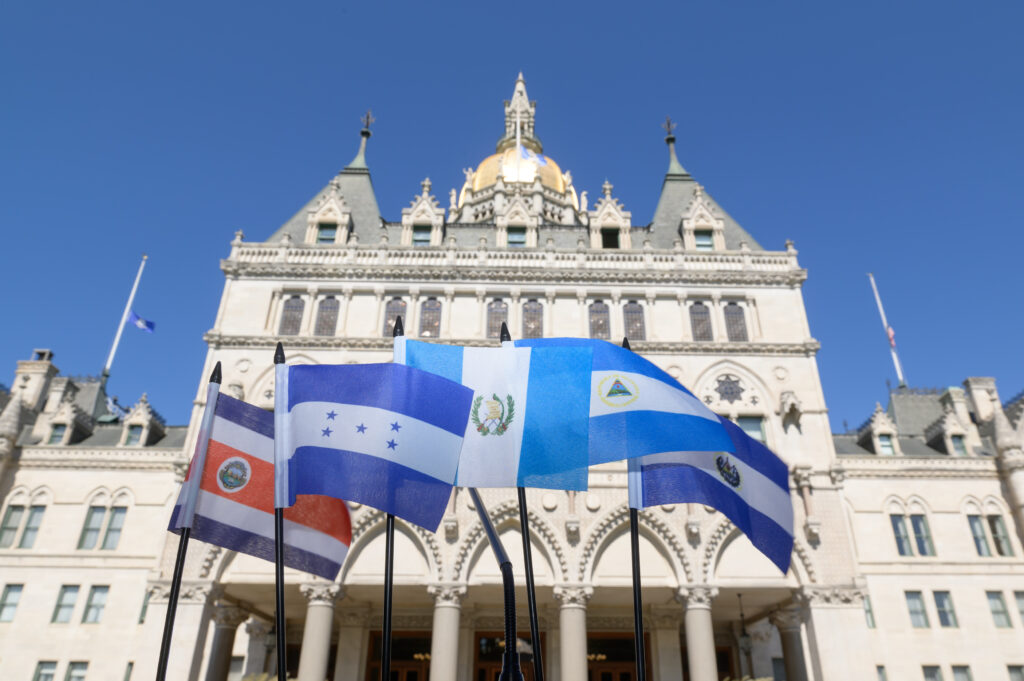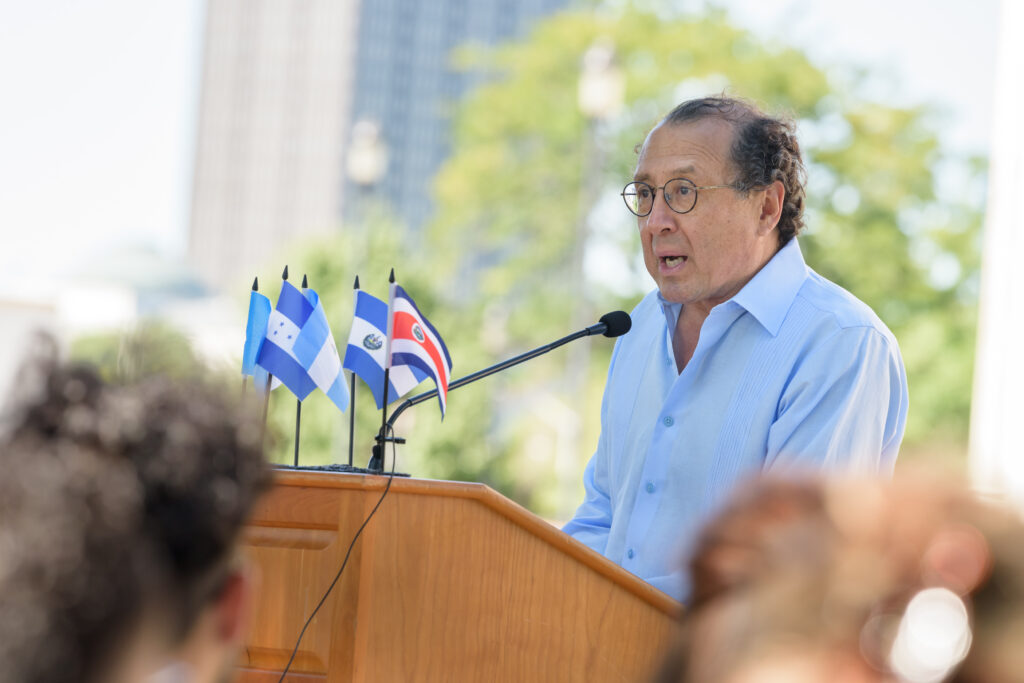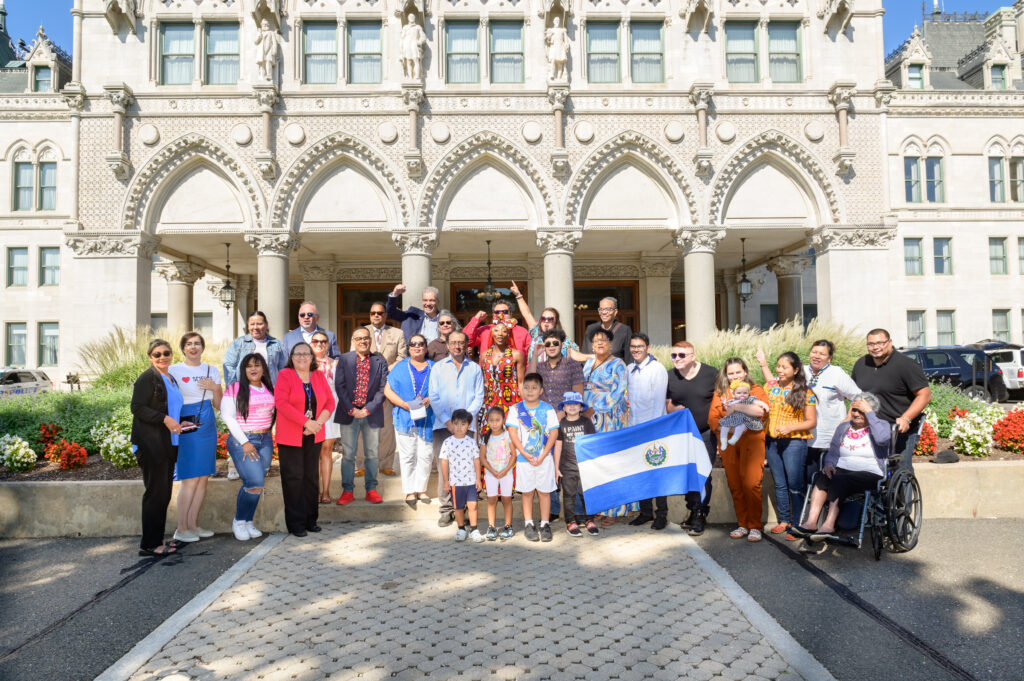Trinity Joins Hartford Community in Celebrations of Central American Independence
The Trinity College community participated recently in a celebration of Central American independence as part of a larger effort to spread knowledge and awareness of Central American culture, history, and immigrant experiences.

In partnership with the Central America United Committee of Hartford, Trinity’s Center for Caribbean Studies organized a series of the flag-raisings at the Connecticut State Capitol in Hartford. The flags of the five Central American countries that gained independence from Spain on September 15, 1821— Costa Rica, El Salvador, Guatemala, Honduras, and Nicaragua—were flown at the Capitol for several days each beginning on September 5, culminating with a ceremony marking 201 years of independence on September 15, 2022. The celebration was co-sponsored by Trinity’s History Department.
Trinity’s Center for Caribbean Studies, led by its co-directors, Charles A. Dana Research Professor of History and International Studies Dario A. Euraque and Professor of Music Eric A. Galm, explores and celebrates the distinctive Caribbean character of the city of Hartford and the influence of Caribbean civilization on contemporary cultures around the world. It conducts collaborative research and hosts cultural events and exchanges that build upon the region’s transnational connections, while helping Trinity students develop as engaged global citizens.

Euraque, who came to America from Honduras when he was 8 years old, has lived in Hartford and taught at Trinity for 32 years and now serves as president of the Central America United Committee of Hartford. Every fall since 2016, Euraque has taught a history course called “The History of Central American Immigration to the United States,” in which he introduces students to immigrants living in the Hartford area. “They speak to the students in my class and the students write papers about them,” Euraque said. “The students also came to my house for a cookout on September 15, the formal day of Central American independence. Everyone got to socialize, sing the national anthems of each of the five countries, and read part of Central America’s declaration of independence. They even had a chance to eat Central American food, including homemade tortillas on the grill.”

For Euraque, who has written books both in Spanish and in English, this course is a chance to teach students about life experiences different from their own. “One can hold, as I do, an attachment and identity linked to my region and country of birth, while simultaneously appreciating and engaging in the country in which I have made most of my life,” he said. “I try to convey the idea that borders are on one level of one’s identity, just sort of legal dimensions of one’s existence, but that one’s life is really a complexity of a whole range of experiences. I developed this course five years ago to engage students, faculty, and administrators in getting a sense of who Central Americans really are and why they come here.”
Abigail Fisher Williamson, the director of Trinity’s Center for Hartford Engagement and Research and associate professor of political science and public policy and law, said, “Professor Euraque’s class is a wonderful example of how interaction with Hartford community partners enriches student learning. The annual celebration of Central American independence promotes meaningful connection through the sharing of food and music, and learning about Central American history and migratory connections to Hartford.”

Additional events held to celebrate Central American independence in Hartford included a Yard Goats baseball game that hosted a special pre-game ceremony with a parade of flags and performances. Euraque threw out the ceremonial first pitch before that game on September 8. In addition, the Hartford Athletic soccer team hosted a “Noche Latina” with cultural presentations on September 10.
Euraque’s students and the larger Trinity community also recently had the opportunity to hear more about immigration issues from Karla Moncada, an associate attorney at Americans for Immigrant Justice. During her visit hosted by Trinity’s Center for Caribbean Studies, Moncada delivered a lecture called “Undocumented Immigrant Children from Central America and U.S. Law” at the Smith House on September 14. The program was co-sponsored by Trinity’s International Studies Program, Political Science Department, Center for Urban and Global Studies, Human Rights Program, and Office of Community Learning.
